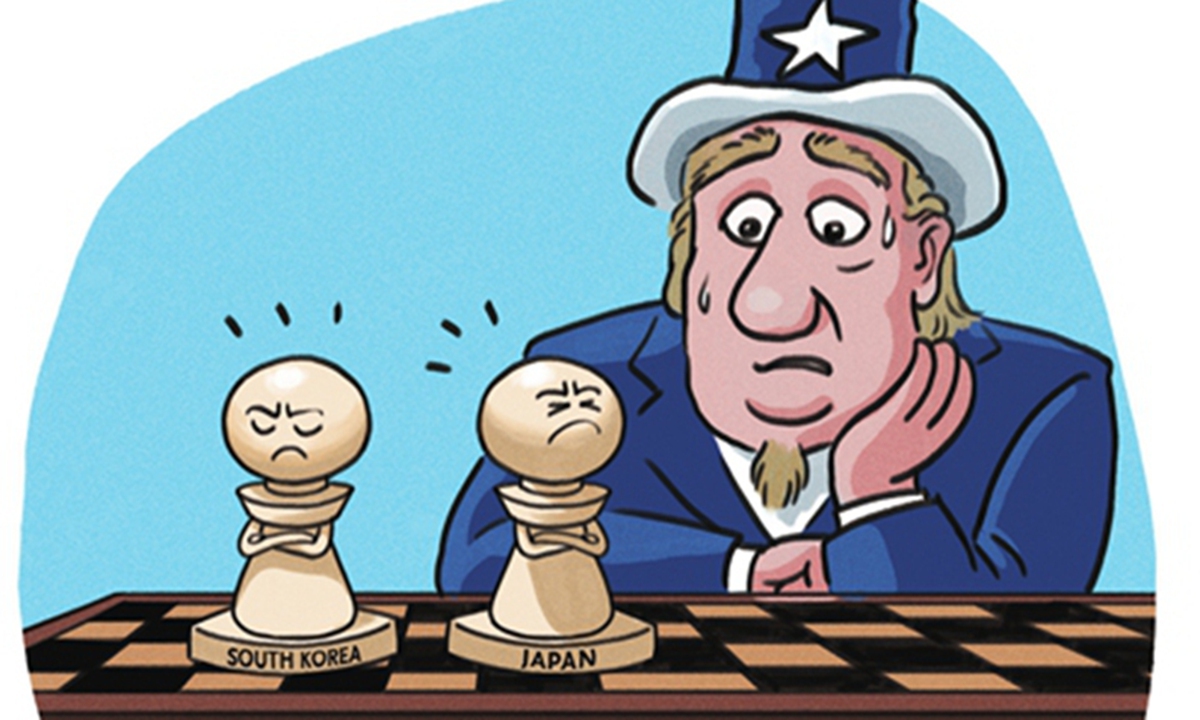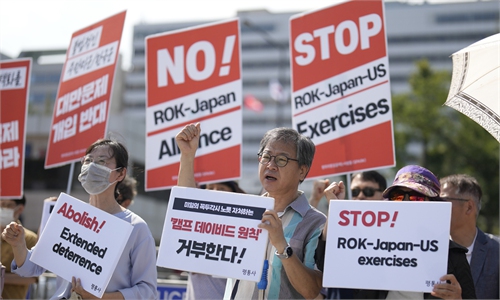
Illustration: Liu Rui/GT
During a Silicon Valley roundtable held on Friday, South Korean President Yoon Suk-yeol and Japanese Prime Minister Fumio Kishida took the opportunity to praise each other. What was most impressive was when Yoon said that he had "cleared up all the difficulties with Japan." Kishida, on the other hand, claimed that this event at Stanford University was a "big game" for him and Yoon. As a result, mainstream media in South Korea described the close and deep friendship between the two presidents as "bromance."It is gratifying if the relations between the two East Asian neighboring countries will really be reconciled completely. But there is a fear that Seoul seems to have a romanticized illusion about Tokyo.
It is true that relations between South Korea and Japan have changed considerably since Yoon took office. As the South Korean president said, this event at Stanford University was the seventh time that he met with Kishida this year, while officials from the two countries have realized shuttle meetings at all levels. Similarly, the US, Japan and South Korea have been meeting frequently to show the world their close cooperation, especially in the military field.
However, all this is the result of unilateral and unprincipled concessions by South Korea. It is a result of the proactive compromises of Yoon and his pro-Japanese aides and advisors, Washington's coercion behind the scenes, and, more importantly, Tokyo's unrelenting adherence to its position on issues, such as the "comfort women," the forced labor and aggression during WWII. Moreover, South Korea has turned a blind eye to the fact that Japan has gone further and further down the road of militarization and has become intransigent on the issue of nuclear-contaminated wastewater dumping. In other words, Tokyo has won Yoon's positive assessment of Korea-Japan relations despite not making any change at all.
In some ways, Seoul's romanticized view of Tokyo and Yoon's pursuit of a "bromance" with the Japanese leader could work as an impetus for the development of the relationship between the two countries, adding more colors to the dull and dry politics. However, it is clear that international relations are not to be handled by "bromance." While Japan's irresponsible attitude on the WWII issues and nuclear-contaminated wastewater dumping defies public knowledge and justice, some distant countries either support it or acquiesce for geopolitical considerations. But that should not be the case for South Korea, a country that not only suffered from Japan's militarism in the past, but is also a direct victim of Japan's dumping. Instead of stopping Tokyo's wrongdoings, Seoul has adopted an encouraging attitude that emboldens Japan to speed along the wrong path. This is undoubtedly irresponsible to history and the security of Northeast Asia.
The Yoon administration's actions reminded me of Madame Bovary, the main character in the novel of the same name by French writer Gustave Flaubert. Madame Bovary has romantic ideas about love, yet it is nothing more than a romanticized illusion. When this fantasy clashes with reality, tragedy is bound to happen. Sooner or later, South Korea will be hoisted by its own petard. This will be a tragedy not only for Seoul, but also for Northeast Asia.
The author is the director and professor of the Center for Korean Peninsula Studies at the Shanghai University of International Business and Economics. opinion@globaltimes.com.cn

